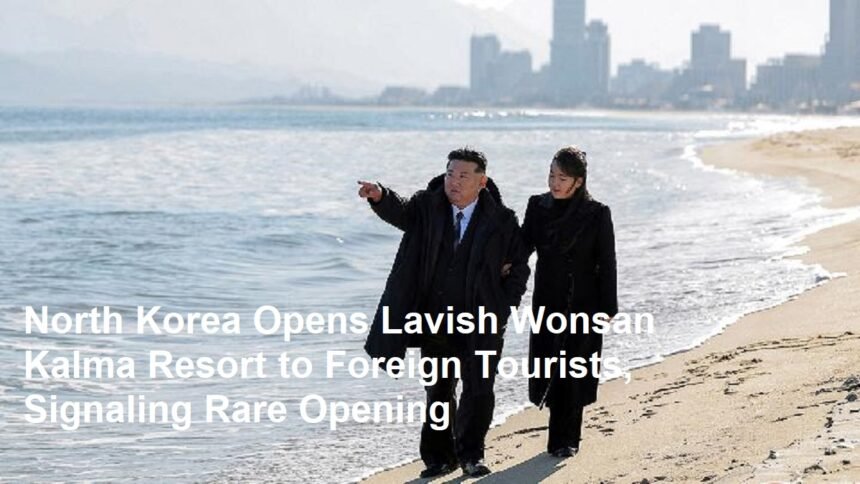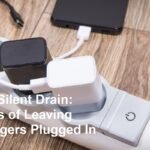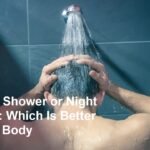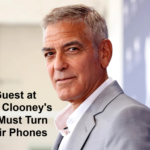Introduction
In a move signaling a cautious, selective reopening to the outside world, North Korean leader Kim Jong Un has officially declared the luxurious Wonsan Kalma Coastal Tourist Zone open for foreign tourists. This long-anticipated development marks a significant, though tightly controlled, step by the isolated regime to generate foreign currency and showcase a carefully curated image of modernity and leisure, distinct from the country’s widespread economic hardships and political repression.
A “Socialist Fairyland” by the Sea
State media, particularly the Korean Central News Agency (KCNA), broadcasted the opening ceremony held on Wednesday, featuring Kim Jong Un cutting the ribbon. The resort, located on the scenic east coast near the city of Wonsan and its airport, has been a pet project of Kim’s for nearly a decade. Construction began in 2014, facing delays, but state media now hails it as a “socialist fairyland” and a “world-class” destination.
The Kalma Resort boasts an array of amenities designed to attract international visitors:
- Sprawling Water Park:Featuring multiple slides, wave pools, and relaxation areas, positioned as a major draw.
- Beachfront Access:Offering pristine, white-sand beaches along the Sea of Japan (East Sea).
- Modern Hotel Complex:Providing accommodation ranging from standard rooms to high-end suites.
- Shopping Center:Offering both local goods and potentially imported items (availability subject to sanctions).
- Sports Facilities:Including a golf course, riding club, and other recreational options.
- Cultural and Dining Venues:Restaurants serving Korean and international cuisine, and spaces for performances.
Kim’s Vision: Prestige and Hard Currency
The opening aligns directly with Kim Jong Un’s stated goals of developing the tourism sector as a vital source of foreign revenue, circumventing international sanctions that severely restrict other forms of trade. Promoting the resort serves multiple purposes for the regime:
- Economic Lifeline:Attracting tourists, primarily expected from China and Russia initially, brings in much-needed hard currency like Euros, Chinese Yuan, or US Dollars.
- Propaganda Showcase:The resort allows North Korea to present a facade of prosperity, modernity, and normalcy to selected foreigners, contrasting sharply with the reality experienced by most citizens. It reinforces the image of Kim as a modernizing leader.
- Regional Development:Part of broader, though often stalled, efforts to develop the Wonsan-Mt. Kumgang area into an international tourism hub, reviving the spirit of the now-closed South Korean-funded Mt. Kumgang resort.
- Diplomatic Signaling:Opening to tourists, even selectively, can be interpreted as a tentative gesture towards engagement, potentially easing tensions or creating channels for interaction, albeit highly controlled.
The Tourist Experience: Controlled Access and Stark Contrasts
Prospective tourists should temper expectations of a typical international resort holiday. Travel to North Korea remains highly restrictive and controlled:
- Mandatory Tours:Foreign visitors cannot travel independently. They must book through state-approved tour operators (based in China or Russia primarily) and be accompanied by government minders/guides at all times.
- Limited Itinerary:Movement is strictly confined to pre-approved routes and sites, primarily within the resort complex and potentially a few select nearby locations. Access to ordinary towns or interaction with locals outside staged encounters is forbidden.
- Visa Requirements:Obtaining a visa remains complex, subject to political climate, and often requires justification beyond tourism. Nationals of certain countries, especially South Korea and the US, face significant barriers.
- Digital Isolation:No independent internet access or international phone service is available. Communication with the outside world is extremely limited.
- Stark Reality:The resort’s opulence exists in stark contrast to the poverty, strict social control, and lack of basic freedoms visible just beyond its perimeter. This dissonance is a core part of the experience, intentionally or not.
Ethical Concerns and Geopolitical Context
The opening reignites ethical debates surrounding tourism in North Korea:
- Funding the Regime:Money spent directly benefits the ruling Workers’ Party and its military apparatus, implicated in widespread human rights abuses and nuclear weapons development. Critics argue tourism legitimizes and finances the regime.
- Labor Conditions:Questions persist about the conditions under which the resort was built, with potential involvement of forced or prison labor – allegations the regime denies.
- Safety and Risks:Travel advisories from many Western governments strongly warn against travel to North Korea due to the risk of arbitrary detention, severe penalties for minor infractions, and lack of consular access. The case of Otto Warmbier remains a chilling reminder.
A Calculated Opening
The launch of the Wonsan Kalma Resort to foreigners represents a calculated gamble by Kim Jong Un. It demonstrates a willingness to engage with the outside world on Pyongyang’s strictly defined terms, prioritizing economic gain and propaganda value. While it offers a unique, albeit heavily filtered, glimpse into a closed society for adventurous travelers, it comes with significant ethical dilemmas and practical restrictions. The resort’s long-term success in attracting substantial numbers of foreign tourists, particularly beyond its immediate neighbors, remains uncertain, heavily dependent on the volatile geopolitical climate and the international community’s stance on engaging with the sanctioned state. For now, the “socialist fairyland” stands as a symbol of North Korea’s paradoxical blend of isolation, aspiration, and tightly controlled exposure.












